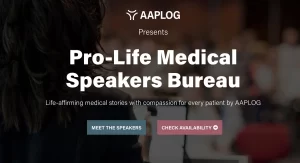In the latest two episodes of AAPLOG’s podcast, Caring for Both: A Curbside Consult Series, Maternal Fetal Medicine specialist Dr. Jeff Wright and AAPLOG CEO Dr. Christina Francis discuss the life-affirming approach to treating previable pre-labor rupture of membranes (PROM). This condition has been frequently mentioned by pro-abortion advocates as an example of a serious pregnancy complication that requires induced abortion as a treatment. In fact, OB hospitalists like Dr. Francis and MFM specialists like Dr. Wright treat these conditions routinely and fully in alignment with their life-affirming values (and pro-life laws).
Topics covered in these two episodes include an overview of what PROM is, its causes, the risks PROM poses to a pregnant mother and her preborn child, the treatments that are available for PROM, fetal survival rates of this condition, the risks and benefits of attempting to prolong pregnancy when treating this condition, and the law versus the ethics of managing previable PROM.
As an example of notable insights from this conversation, Dr. Wright said the following about the common concern that refusing to immediately end a pregnancy will lead to a life-threatening infection:
Not all infections are alike. Your common case of chorioamnionitis, also called intra-amniotic infection, is an infection that’s in the uterus, in the membranes [or] in the uterine wall. It’s pretty common overall in pregnancy, even at term, but in preterm PROM, about a third of the patients are eventually going to develop chorioamnionitis. And that’s regardless of gestational age. Now, conversely, a true life-threatening maternal infection, meaning sepsis, that’s rare. So the standard procedure is if chorioamnionitis develops, you start broad-spectrum antibiotics and you deliver the baby.
Properly managed, properly monitored, maternal sepsis is rare. In fact, if you look at the large studies… for example, the Oracle One trial had over 4,000 pregnant women in it. The Oracle One trial looked at antibiotics used trying to improve outcomes in PROM, and they don’t even mention maternal sepsis. The finding is really so rare in prospectively managed patients.
We hope that these episodes present an informative and helpful deep dive into how pro-life physicians can offer excellent obstetrics care to both pregnant women and preborn children even in the face of potentially life-threatening challenges.






